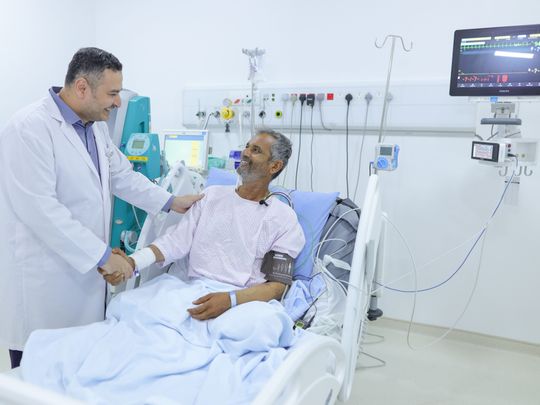
Abu Dhabi: An Indian expatriate man diagnosed with an extremely rare and possibly fatal blood clotting has been successfully treated at an Abu Dhabi private hospital.
Lal Telu Ram Harkesh, 52, initially reported to Lifecare Hospital with what seemed like a simple abdominal pain and fever, but was later diagnosed with Thrombotic Thrombocytopenia Purpura (TTP) — a rare disorder of the blood coagulation system that usually affects four to six persons per million. TTP can be life-threatening because the blood clots that form in the small blood vessels throughout the body can limit or block blood flow to the major organs. This in turn can damage the brain, kidneys and heart.
“During the initial evaluation, he seemed to be suffering from acute pancreatitis. But he had low red blood cell and platelet counts that did not correlate with the preliminary diagnosis. The ADAMTS 13 test confirmed he had TTP, a rare disease that can be fatal if left untreated. This is the first case of TTP we are coming across in our hospital,” said Dr Ashraf Abdelrahman, head of the department for critical care services.
Haemodynamic instability
He added that patients require close monitoring as they are at high risk of altered conscious level, seizures, hemiplegia and multiorgan failure. For a patient confirmed with TTP, the treatment itself can induce serious haemodynamic instability.
According to Dr Mathew Vadakoot, specialist gastroenterologist, diagnosing TTP is a challenge as it is a rare disease with very vague symptoms and the confirmatory test is performed only in a few laboratories in the country.
Following the diagnosis, Harkesh was shifted to the Intensive Care Unit (ICU), where he was started on therapeutic plasma exchange, in which the patient’s plasma is replaced with plasma donated by healthy individuals. “Harkesh received a total of ten sessions of TPE daily, with almost 30 litres of plasma exchanged. He was also treated with steroids and monoclonal antibodies medications,” said Dr Abeesh Pillai, specialist nephrologist.
‘Abdominal pain’
Harkesh remained deeply sedated and intubated because he was also suffering from seizures and lack of consciousness. The mechanical ventilation was only removed when his condition improved and the entire process took around 18 days.
“Prior to going to the hospital, I had abdominal pain for around 20 days and had ignored it as regular gastric trouble. When I was later diagnosed with a rare disease, I got scared. But the doctors and other hospital staff supported me mentally and physically. All thanks to the Almighty and doctors, this is my second life,” said Harkesh, who works as a foreman in an Abu Dhabi company.
“As he has completely recovered from this initial attack, Harkesh should be able to lead a normal life, but relapse can occur at any time. So, he should follow up regularly. Most patients will have a complete recovery, but relapse can occur in 30 per cent of patients,” he cautioned.
Possibility of relapse
Early detection and treatment of TTP flare-ups are crucial in preventing irreversible damage to vital organs that cab lead to death. However, a few questions remain unanswered, including why TTP happens, why patients relapse after achieving remission, and how to cure the disease?
“What we know about TTP is that it is a true medical emergency and without treatment, 95 per cent of patients die,” said Dr Baiju Faizal, an internal medicine specialist who also cared for Harkesh.
Because there is no method of preventing TTP or its relapse, patients must adopt a healthy lifestyle by avoiding smoking, ensuring adequate hydration, getting proper sleep and adopting a diet low on carbohydrate, salt and fat.








